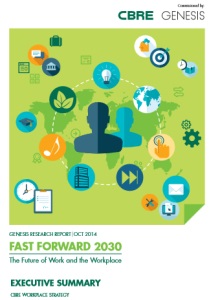
by Brianna Crandall — November 28, 2014—Emerging trends in the workplace point to a revolution in the way workplaces operate in the next fifteen years, according to a white paper launched jointly by Global property advisor CBRE Group and Genesis, a leading real estate innovator, developer and operator from China. The paper is based on interviews with experts, business leaders and young people from Asia Pacific, Europe and North America, and covers a broad range of topics including: how workplaces will change, how landlords must adapt, and how employees themselves are changing.
CBRE Group says that by seizing the opportunities created by expected revolutionary changes early, smart companies can gain a competitive advantage. Genesis comments that the report can help companies understand how to create new high-performance, convenient workspaces that are not only aesthetically pleasing, but are also in line with the social values of the workforce of the future.
The key findings of the report are as follows:
1. Artificial intelligence will transform businesses and the work that people do.
- Process work, customer work and vast swathes of middle management will simply disappear: 50% of occupations today will no longer exist in 2025.
- New jobs will require creative intelligence, social and emotional intelligence, and the ability to leverage artificial intelligence. Those jobs will be immensely more fulfilling than today’s jobs.
- Workspaces with row of desks as we know them today will be completely redundant—not because they are not fit for purpose, but simply because that purpose no longer exists.
2. For employees, purpose is more important than financial success.
- There is a significant and global trend among all people, but particularly the youth, towards happiness, purpose and meaning being as or more important than financial success.
- Corporations will not only need to be lean and agile, they must be authentic to attract talent: authentic in their values and in making a real contribution to the social good.
- As the nature of work changes, more social entrepreneurship is expected to be seen.
3. Online trading will emerge for real estate.
- By 2030 the majority of real estate transactions may be made online, and the majority of transactions will be made by the users of the space using real time marketplaces (similar to Uber) that help the find the best and most effective place to work.
- Real estate traditionally changes slowly, but these new emerging aggregators could revolutionize the market, allowing tenants and many types of building owners in cities to contribute wasted and unused space back into an eco-system of available space.
4. Landlords will focus more on delivering services.
- Buildings will be much healthier environments, and landlords will need to create partnerships with providers who can help create services and experiences in addition to basic lease tenancies.
- As landlords start delivering more complete solutions, they will rate their building’s value not by the cash flow of rent but in the cash flow from the services.
High Performance Workplace of the Future
Given the coming dramatic changes in how we work, companies will need to re-learn how to obtain high performance from employees and contractors.
“The ability to attract and retain top talent will be the top competitive advantage for businesses in 2030, followed by innovation, adaptability, and technology adoption. The design and organization of the new workplace will be key to achieving this,” commented Martin Chen, chief operating officer (COO) of Genesis.
Young people interviewed for the report clearly indicated that the workplaces of 2030 will contrast starkly to the workplaces of today and will offer a wide variety of quiet retreat and collaborative settings, each ideal for a specific kind of job or task or designed to suit a specific personal work style. In particular, young interviewees suggested that workplaces of the future will need to support worker health and wellbeing—as did all industry experts and business leaders interviewed for the study. The budding industry of wellness in buildings will grow rapidly in the coming decade.
In order to help businesses achieve these goals, landlords and the real estate industry will also need to adapt, says CBRE.
“Interviewees and those from the younger generation were clear on the need for a more holistic approach to places for work. Traditionally slow to change, the real estate industry must shift from being just a space provider to curators of experience and builders of community —and shape ‘win-win’ partnerships with tenants and new players. There is significant prize for those who understand and commercialize the next generation of real estate solutions,” added Peter Andrew, director of workplace strategy for CBRE Asia Pacific.
The report also underlines a range of other findings, including:
- There is a need to improve employee experience through more meaningful workplaces, and the desire for mood-based working.
- A desire exists for better virtual connectivity to replicate the physical community.
- The physical workplace will become more important even though the ability to work virtually increases, with 77% of interviewees responding as such.
- We will move from thinking about workplaces, towards ‘places to work,’ including outside the office.
- The birth of aggregators could help unlock currently unused but available workspace. New providers will be able to come to market: corporates shedding excess space; retailers and developers providing co-working or club facilities for tenants.
- There is a need for an owner of the “work experience” at the C-suite level.
For this study, 220 experts, business leaders and young people from Asia, Europe and North America shared their views on how workplace trends will impact business, evolve work practices and continue to revolutionize how, when and where work happens. The young people the researchers met in focus groups in eleven cities in particular had an appetite for change and demonstrated remarkable foresight about the future, say CBRE and Genesis.
An Executive Summary of Fast Forward 2030: The Future of Work and the Workplace is available online, and the full report is available upon request.




